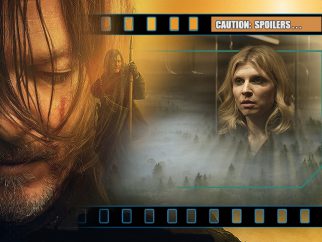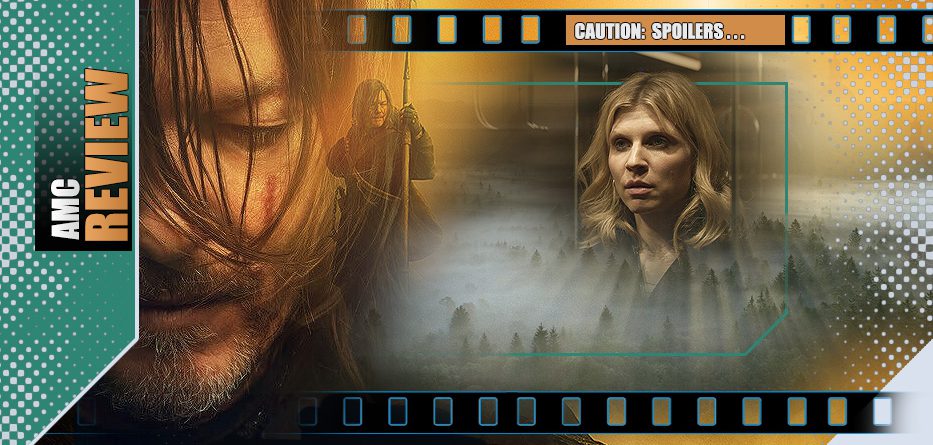Daryl, Isabelle, Laurent and Sylvie start out on the long trek northwards, but after losing their mule, they find themselves surrounded by a group of young orphans who are initially distrustful of their intentions. After convincing their ‘captors’ that they are merely passing through, Daryl learns that the self-sufficient group is facing the loss of their own matriarch, no thanks to supplies being hoarded by a well-armed figure in a local chateau. In exchange for a new horse to carry them forward, Daryl heads to the chateau to find that he may have more in common with him that he’d like.
Isabelle, contemplating on how much to reveal to Laurent about his messianic ‘mission’, remembers the wilder days before she joined the nuns… and the very different life she had in the dying days of the ‘old world’…
*spoilers*
After last week’s launch, Daryl Dixon – as a character and a show – is firmly ensconced in the Gallic countryside and undertaking, still somewhat against his wishes, the protection of the convent survivors – at least until he can get to La Havre and possibly find a way to set sail back to the US (because… yeah, that’s going to happen anytime soon!). Alouette is, of course, that famous French/Canadian song of which almost everyone will be able to sing the opening lines -even if not knowing its exact ‘lark-plucking’ meanings – and has been used to teach the earliest entry into language for over a century.
Isabelle’s back-story quickly gets some attention and some nicely choreographed dance moves- and we see her far from the nun she’ll ultimately become. We first see her partying heavily with drugs and alcohol in high-end night-clubs, grinding away to New Order‘s Blue Monday and being revealed to be a sticky-fingered picket-pocket as well. (Those fingers are attached to wrists with old scars that seem to indicate multiple suicide attempts at some point). Then we follow her on the night that the undead apocalypse took hold in Paris, circa 2011ish. (That’s not stated, but apparently will be specifically confirmed later, which does feel a little askew from franchise chronology). It’s also been a long while since we’ve seen such images in the franchise – The Walking Dead mothership had some flashbacks but mostly concerned itself with events in more rural areas and weeks and months after the outbreak and it was left to Fear the Walking Dead to depict the initial carnage. Here, tightly-shot but well-choreographed in actual French streets (if not actually Paris itself for the most part) the chaos rolls out quickly but in waves, with Isabelle wandering around and catching glimpses of things going wrong on the Metro and in back-streets. She is then saved by her partner-in-crime Quinn (Adam Nagaitis) who feels more like a pimp than her friend and trying to get to her sister Lily (Faustine Koziel) to safety. As we follow their subsequent escape from the city in snippets scattered throughout the episode, we see the sisters leave Quinn behind (after he says they have to do the same to Lily when they discover she’s seven months pregnant and undergoing complications). Somehow I doubt we’ve seen the last of him.
It’s so far, so good with Daryl Dixon. The sheer change of location and the streamlining of the ensemble has meant a far more finely-tuned outing… one that largely plays to the old tunes and known strengths, but feels richer and better orchestrated with an ongoing gallic flair…
If the initial episode seemed to lean in the direction of yet another post-apocalyptic protector/child set-up akin to The Last of Us, then elements in the second episode will likely have some rolling their eyes. Included in Isabelle’s back-story is the fact that she’s ultimately shown to be Laurent’s aunt and that the baby was born after Lily had been bitten and then eventually ‘died’ on the makeshift operating table – her child surviving. That’s unfortunately very, very similar to the revelations about Ellie’s origin in the TLOU game and, more explicitly in this year’s season finale of the HBO adaptation. Again, it’s likely that Alouette was conceived before The Last of Us‘ finale’s details were known but this episode does suffer in inevitable creative comparison. Isabelle has said that her Order believed that Laurent would be the new Messiah, but though one could argue that the baby’s survival was a miracle in a ‘beating the odds‘ sense, there’s little so far to suggest that Laurent is anything other than very lucky and something of a petulant old soul, so hopefully we’ll get more of the backstory as we continue.
There’s a feeling of Peter Pan’s Lost Boys and Lord of the Flies in the community that Daryl and his survivors find – essentially a colony of mainly children and teenagers led by Kim Higelin’s Lou. There’s some explanation of the origins of the enclave and how they’ve lasted, though it doesn’t make a great deal of sense logically with so little protection for the kids and so many dangers relatively close-by (If the make-shift army of rebels was taking kids to bolster their numbers, it seems unlikely they’d have overlooked this group, rich for the pickings, even if already well-armed) and surely turnover would have meant more adults eventually. But as well as providing some drama, it also provides some of the episode’s more wry and humourous moments. Daryl’s version of saying ‘Grace’ and eating his food raises some eyebrows and smiles. An old tv set-up (powered by a bike, no less) shows old video tapes and one is Mork and Mindy, with an episode the kids have now learned off by heart. It brings back mixed feelings for Daryl (who remembers escaping with brother Daryl from his domestic abuse by watching it on original broadcast) and a genuinely poignant moment when the kids send off their fallen matriarch with a heartfelt Nanu, Nanu salute. There’s some cultural sideswipes with other moments of knowing dialogue with others wondering why ‘Father Daryl’ hasn’t learned the language if he’s supposedly been there so long according to Isabelle’s cover-story. ‘American‘ Isabelle succinctly explains as she rolls her eyes. Equally, the ‘Lord’ of the castle turning out to be an American who thinks Daryl will side with him because they’re both Southerners is a stereotype but a revealing one.
Daryl’s previous weapon of choice was a crossbow, so it’s ironic that it’s mainly others using them this week – with Daryl swinging a mace around like he’s prepping for a medieval venture. As noted last week, the sheer breadth and depth of genuine backdrops – be it the pre-apocalyptic French streets or the chateaus and buildings of rural France, give the show a feeling of situation that was long missing in the often sprawling but generic landscapes of the main series. Here, literal moats and battlements have to be navigated on the way to salvation.
Again: so far, so good with Daryl Dixon. The sheer change of location and the streamlining of the ensemble has meant a far more finely-tuned outing… one that largely plays to the old tunes and known strengths, but feels richer and better orchestrated with an ongoing gallic flair…
The Walking Dead: Daryl Dixon is on AMC every Sunday at 9:00 EST (and streamed earlier on AMC+)

- Story8
- Acting8
- Direction9
- Production Design / VFX9











